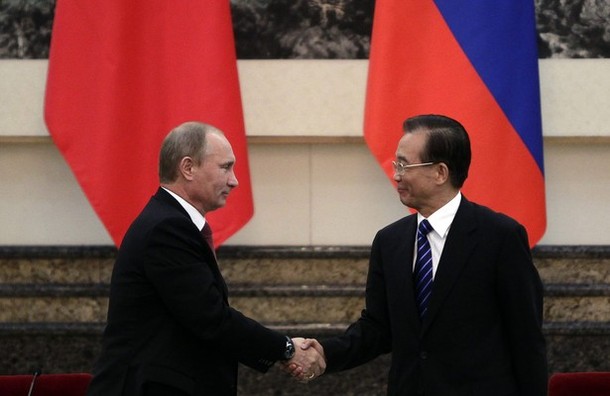
From Rafaello Pantucci and Alexandros Peterson, the International Herald Tribune: Just before his visit to Beijing, [Russian Prime Minister Vladimir] Putin had announced a desire to form a new Eurasian Union that would tie a number of former Soviet states back into the Russian orbit. Hands immediately starting wringing in Brussels. At this time of E.U. weakness, the Eurasian Union was seen to be aimed at counterbalancing Western institutions.
These concerns are largely ill-founded. While the new organization is clearly an effort by Russia to reassert authority over its old dominions, it is in fact aimed East rather than West. Russia is far more concerned by growing Chinese influence in its backyard than anything the West is throwing its way.
The core of Russia’s concerns is the slow but steady progress of the Shanghai Cooperation Organization, originally set up in the post-Cold War period to define borders between its five members — China, Kazakhstan, Kyrgyzstan, Russia and Tajikistan ( later joined by Uzbekistan).
But in the last 10 years the S.C.O. has evolved into the most interesting, and perhaps consequential, example of Chinese diplomacy. As a Chinese scholar put it to us the other day in Beijing, the organization went from being focused on regional security to honing in on regional development — a trajectory that accords tidily both with China’s and the Central Asians’ interests. . . .
The S.C.O. was initially ignored by Russia when it was set up a decade ago, but it has steadily developed into an increasingly important actor that has become a vehicle for China’s push to develop Central Asia. . . .
Using its deep pockets to pour money into the poor and isolated Central Asian states, China has secured energy contracts, worked on hydroelectric plants and helped develop infrastructure from roads to telephone systems.
Raffaello Pantucci is a visiting scholar at the Shanghai Academy of Social Sciences. Alexandros Petersen is an adviser at the Woodrow Wilson International Center for Scholars in Washington. (photo Reuters)
Image: reuters%2010%2017%2011%20Putin%20Jiabao.jpg
